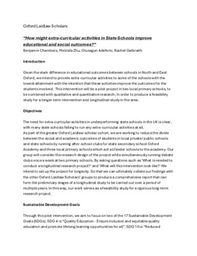Reflections on week 2 of research project
Laidlaw Blog 13/09/2024
Though the preparation for the delivery of our extra-curricular programme began many weeks ago, this week was the first time that we could see the manifest effects of our planning.
Going into our first school, we had little understanding about what to expect. We knew nothing of the class size, the space that we'd be given to run the club, nor the nature of the students who had opted to attend. As such, we had to be open to adapting our plans and structure as the day commenced. Despite our shared understanding that we would have to think on our feet to accommodate whichever group we were running the session for, we were still caught off-guard by the pupils. For one thing, the group size (which we had capped at 16) had only 8 sign-ups with only half of those signed up attending on the first session. We had not thought about the unfortunate timing of our first session being on one of the first Monday's back after the summer holidays and immediately after the year 6 swimming lessons. Nonetheless, we were inspired by the four children who had made it to the session and allowed them to steer the direction of the session in a way which would not have been possible with a larger group.
Having watched other Laidlaw scholars' run through their extra-curriculars days prior, and done the same ourselves, we had noticed that in comparison to other, more creative and energetic activities, we were likely to struggle in keeping students engaged for the whole hour. As such, we incorporated some of the other scholars' ideas on energising the pupils into our programme. We also thought more carefully about the ease at which yr5 and 6 students would be able to pick up new vocabulary and accurately use specific debating terminology. However, when we went into the primary school, two things surprised me. The first is the extent to which students were eager to discuss the motions and formulate their own arguments. And the second was their reluctance to practice using basic debating terminology (with one student exclaiming something along the lines of 'why does this all have to be so confusing!') This has made me, and the others in my group reflect on our delivery. Throughout the session we started incorporating unfamiliar terminology more naturally in conversation with many students mimicking our conversational style. It was great seeing the students maintain their passion across the session but learning to express themselves more clearly and respecting the opinions of their peers. While at the beginning of the session the excitement of the children meant that they tended to talk over one another and veer off topic, by the end they were taking turns talking and responding clearly to each other with rebuttals and supporting points.
Now that one intervention is done, the way forward has become clearer. The need for increased advertising to incentivise more attendees has already been fulfilled by the creation of a poster and the promise of a treat to those who attend the next session. The constantly shifting variables have meant that running the sessions themselves has been a super dynamic process. The prosect of continuing to learn more from my fellow scholars and the children at both of the primary schools is incredibly motivating and I am excited to compare my experience at each school.
In terms of the academic side of this project, this week has been enlightening. It truly feels as though the vision for each group is much clearer and our role as part of the whole feels much more concrete. It's been a productive week in terms of planning and though there aren't many tangible results, I feel much secure about the next steps with a detailed plan for next week.

Please sign in
If you are a registered user on Laidlaw Scholars Network, please sign in